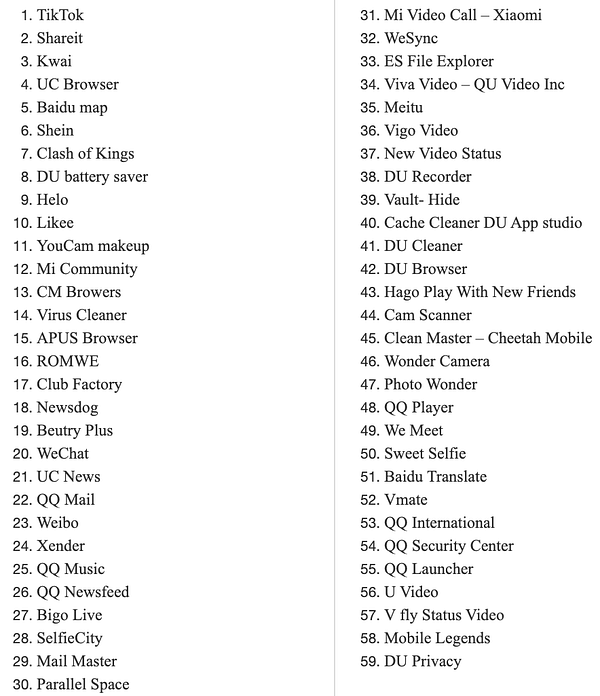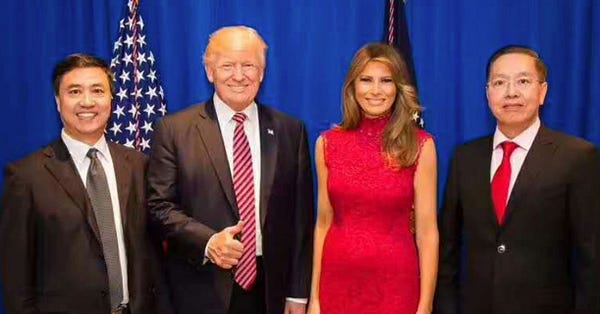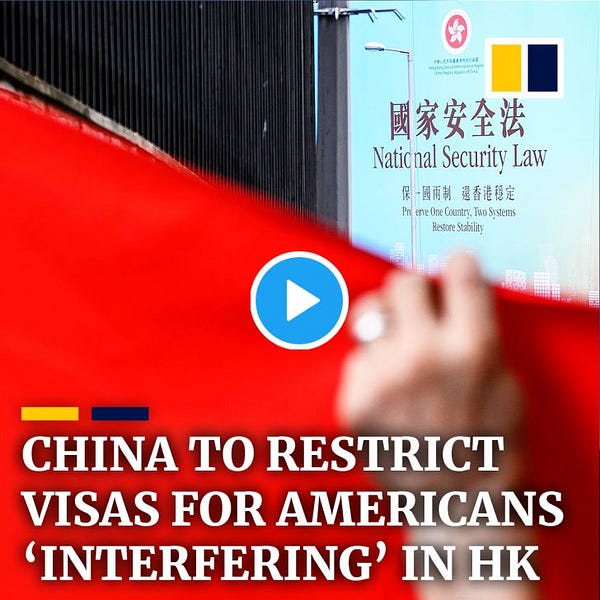Welcome to the latest edition of Trade War. This week was another where politics and security trumped economics and business, with both the U.S. and India taking steps to sanction Chinese companies.
In the U.S., the Defense Department released a list of Chinese companies, including Huawei, that it said were linked to China’s military and thus pose a security risk, while India’s government has banned dozens of Chinese apps, including short video sensation TikTok, saying they could damage national sovereignty.
China, for its part, has warned the U.S. about political “red lines” that if crossed could jeopardize the trade deal.
Invoke emergency economic powers
As Bethany Allen-Ebrahimian of Axios and Zach Dorfman of Aspen Institute write: “The Defense Department has made public for the first time a list of twenty Chinese companies that are operating in the U.S. that are tied to the Chinese military,” including Huawei, Hangzhou Hikvision, China Railway Construction Corporation, and China Telecommunications Corporation.
Why does it matter? “President Trump has the authority to invoke emergency economic powers, including sanctions, against the 20 companies on the list,” they explain.


Prejudicial to sovereignty and integrity
Meanwhile, in a surprise move, the Indian government announced on June 28 that it is banning 59 Chinese mobile apps “which are prejudicial to sovereignty and integrity of India, defence of India, security of state and public order,” tweets Tanvi Madan, senior fellow at the Brookings Institution.



Big blow for China tech
The move could significantly hurt China’s tech companies “which have been looking to developing countries such as India to act as a counterweight to the U.S. for their expansion strategies,” tweets CNBC Beijing bureau chief Eunice Yoon, citing a Wall Street Journal article.


611 million downloads in India
TikTok, for example, has seen about 30 percent of all downloads coming from India, tweets Dhruva Jaishankar, a director at the New Delhi-based Observer Research Foundation.


Red lines shouldn’t be crossed
During the recent Hawaii meeting with U.S. Secretary of State Mike Pompeo, China’s top diplomat Yang Jiechi apparently delivered a warning: both sides had to “work together,” the Wall Street Journal reports, citing people familiar with the conversations.
“The U.S. side should refrain from going too far with meddling,” and “red lines shouldn’t be crossed,” a Chinese official warned the Wall Street Journal. China’s “red lines” here are seen as those it perceives as challenging its sovereignty over Hong Kong and claim to Taiwan.
“You can’t keep asking us to buy your stuff and at the same time keep beating up on us,” said Mei Xinyu, an analyst at a Chinese think tank. “That’s not how it works.”
Influence the new president
A revealing story from the Wall Street Journal’s Brian Spegele explains how Trump has been a big beneficiary of donations connected to the Chinese state. “Trump was a huge question mark for China when he took the White House. Then huge donations flowed to his re-election bid from a secretive network closely tied to Beijing,” tweets Spegele.
“The effort had early success in gaining access for those involved, helping them meet the president or top Republicans at fundraisers or at an internal GOP leadership meeting. It reveals how China seeks to build inroads into U.S. politics, gather information on U.S. leaders and if possible affect policy-making,” the Journal reports.


Australians trust in China declines precipitously
Meanwhile, Australians are losing trust in the Chinese government, a survey by the Sydney-based Lowy Institute shows. “Trust in China among Australians has more than halved amid diplomatic and trade disputes, with only 23% saying they trusted Beijing to act responsibly in the world compared to a 52% reading two years ago,” reports Reuters, citing the poll.
“Trust in our largest trading partner - China - has declined precipitously. Confidence in China’s leader Xi Jinping, has fallen even further,” wrote Lowy Institute executive director Michael Fullilove, Reuters reports.
Josef Stalin’s successor
“As China grew richer and stronger, we believed, the Chinese Communist Party would liberalize to meet the rising democratic aspirations of its people,” said U.S. national security adviser Robert O’Brien in an extremely hard-hitting recent speech aimed directly at China’s top leadership. “Unfortunately, it turned out to be very naïve.”
“Let us be clear, the Chinese Communist Party is a Marxist-Leninist organization. The Party General Secretary Xi Jinping sees himself as Josef Stalin’s successor.”


There is no ideological competition
Meanwhile, here’s an interesting counterpoint from China expert and longtime American diplomat Chas Freeman, who argues the opposite in an interview with The Wire China: that Beijing is not ideological at all, at least when it goes overseas.
“There is no ideological competition. Internationally, China is not attempting to export its system, which frankly, it has great trouble even defining for its own people. We [the U.S.] remain armed evangelists; we like to export our ideology.”
The U.S. has “sought in some ways to beat China back into underdevelopment. We object to its progress. We are trying to cut it off from foreign markets, whether in our opposition to the Belt and Road Initiative or through the attacks on Huawei, ZTE, and other Chinese technology companies,” Freeman says.


Notable/In Depth
This chart on the lobster trade and blog from April, both from Council on Foreign Relations senior fellow Brad Setser, break down the intricacies of how Chinese tariffs do and don’t impact U.S. seafood sales.


Beijing announced it will impose visa restrictions on Americans with “egregious conduct” on Hong Kong, a retaliatory move following Washington’s decision to restrict visas for Chinese officials who are seen to undermine the territory, the South China Morning reports.


Retire 'Taiwan reunifying with the mainland” and replace with it “being taken over,” is my contribution to the now indispensable POLITICO China Watcher’s weekly list of tired China narratives.


essential reading
“Roberts’ book is the latest in an extensive literature highlighting the deep fractures in the Chinese economic model,” writes John West for the Lowy Institute’s “The Interpreter” in his kind review. The Myth of Chinese Capitalism “makes an important contribution to our understanding of China, and should be essential reading for all China-watchers.”





